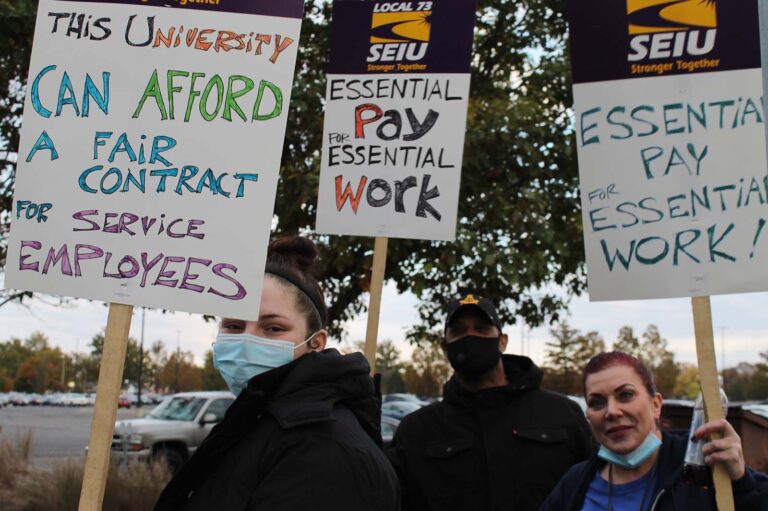URBANA — Service workers at the University of Illinois Urbana-Champaign are willing to strike in September after their current contract expires.
Of the workers who cast their votes over the past two weeks, 91 percent authorized the Service Employees International Union (SEIU) Local 73 to start preparing to strike.
“Not only was it an overwhelming ‘yes’ to authorize a strike, it was also the most votes we’ve ever gotten as a union. So people are not only angry and agitated, they are motivated to show up and vote,” says SEIU steward Michael Lindley.
University spokesperson Robin Kaler says administrators hope to settle on a contract before SEIU’s current contract expires. She says the university has also worked out what to do if the 800-plus facilities and dining workers in the SEIU walk off their jobs.
The vote is a legal formality that university unions often resort to, according to SEIU chief steward Justus Fortado. SEIU members would have to vote again in August before going on strike.
In the meantime, the parties continue to negotiate. The next bargaining session for SEIU dining hall workers is Tuesday. SEIU building service workers will meet with university officials the following week.
Dining, custodial workers wait for raises
SEIU members have been negotiating with University of Illinois representatives since November. In all that time, the university hasn’t communicated what kind of raises it might offer – and workers desperately want raises.
“We have made some progress on minor issues like uniforms and being able to wear shorts when it’s not summer,” says Fortado. “But we have yet to receive any economic proposal from the university.”
Kaler says the university is settling the non-economic issues first.
Lindley says the pace of the process has been frustrating.
SEIU has proposed $5 raises for those making base salaries, to help keep up with the cost of living and wages in the area.
Lindley knows firsthand how much the proposed raises would affect workers’ lives. He has been a building service worker with the university for four years. During the first two years, he made about $15 an hour.
“Right when the pandemic started, I was about one-and-a-half years in. Everything was more expensive,” Lindley says. “Gas was a problem. Food was expensive. The basic necessities, housing – it all adds up.”
To make ends meet, Lindley took on a second job at his previous employer, a small pest control company.
After two years, Lindley jumped from the base salary to just under $21 an hour, the highest salary that building service workers can make. (Longevity doesn’t affect building service worker salary after two years.)
He continues to work both jobs. This adds up to about 60 to 65 hours of work a week, not including his union organizing.
“I do too much if I’m being honest,” Lindley laughs.
Lindley requests that those who want to support university service workers call or email Chancellor Robert Jones.
Emily Hays is a reporter for Illinois Public Media. Follow her on Twitter @amihatt.

